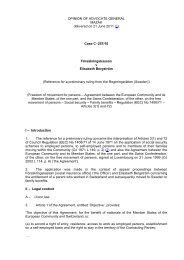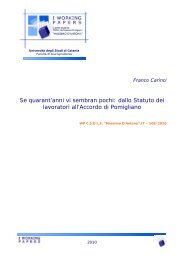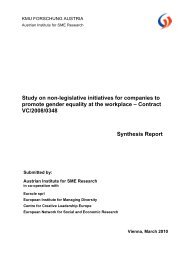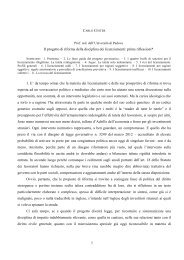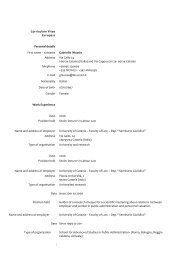Full text - European Trade Union Institute (ETUI)
Full text - European Trade Union Institute (ETUI)
Full text - European Trade Union Institute (ETUI)
Create successful ePaper yourself
Turn your PDF publications into a flip-book with our unique Google optimized e-Paper software.
Temporary agency work in the <strong>European</strong> <strong>Union</strong><br />
Access to collective rights<br />
Temporary agency workers’ access to representation bodies seems to be a<br />
new issue for some Member States. The report shows that agency workers<br />
are more and more represented at the user undertaking, in some cases with<br />
a condition of seniority. Nevertheless, representation at the agency remains<br />
the main option, whereas in few cases temporary agency workers can be represented<br />
in both the user undertaking and the temporary work agency. As<br />
regards information and consultation of workers’ representatives about the<br />
use of temporary agency work, the report shows that it already exists in a fair<br />
number of Member States, even if it is not always automatic.<br />
The more favourable clause and the non-regression clause<br />
The Directive only sets minimum standards, meaning that Member States<br />
can provide further, more favourable protections. Additionally, the so-called<br />
non regression clause secures that implementation measures shall not constitute<br />
grounds for reduction in the general level of protection in the fields<br />
covered by the Directive. This issue seems not to have attracted the attention<br />
of many national legislators.<br />
Effective, proportionate and dissuasive measures<br />
The last substantive rule enjoins Member States to take effective, proportionate<br />
and dissuasive measures to ensure application of the Directive. The<br />
sanctions provided by Member States’ legislation vary widely, from penal<br />
sanctions, such as fines or imprisonment, to civil sanctions, such as damages,<br />
rewriting of the employment contract or withdrawal of the license. No report<br />
clearly stresses whether sanctions are satisfactory or not, as it is probably too<br />
early to draw any detailed evaluation on this particular aspect. .<br />
In an extra section, attention is given to the articulation between the Temporary<br />
Agency Work Directive (2008/104/EC), the posting of workers Directive<br />
(96/71/EC) and the pending <strong>European</strong> Commission’s proposal on the socalled<br />
‘Enforcement Directive’, which will (if adopted) provide mechanisms<br />
designed to enforce the Directive on posting of workers so as to propose, according<br />
to the <strong>European</strong> Commission, a clearer definition of its scope, a better<br />
understanding of the articulation of economic freedoms and protection<br />
of workers, as well as better enforcement of the Directive itself, following the<br />
well-known CJEU cases, Viking (C-438/05), Laval (C-341/05), Rüffert (C-<br />
346/06) and Commission v. Luxembourg (C-319/06). A critical assessment of<br />
this later draft directive stresses the lack of ambition of the proposal and the<br />
little impact it will have on solving the existing loopholes and deadlocks in<br />
promoting better working conditions and fundamental social rights of cross<br />
border (temporarily agency) posted workers.<br />
Finally, the report ends with a critical assessment of the transposition measures<br />
of the Directives in the domestic legislation of the Member States, revealing<br />
worrying trends witnessed in various member states, in which, for<br />
example, the transposition measures are unsatisfactory or non-existent, or<br />
where Member States have adopted a minimal interpretation of the provisions<br />
of the Directive.<br />
Report 125 9





